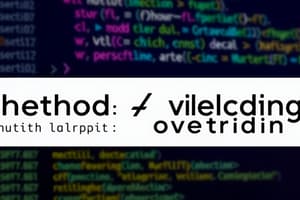Podcast
Questions and Answers
What allows overloaded methods to be differentiated?
What allows overloaded methods to be differentiated?
- Both B and C (correct)
- Return type
- Type of arguments
- Number of arguments
In Java, you can declare two methods with the same signature if they have different return types.
In Java, you can declare two methods with the same signature if they have different return types.
False (B)
What is the output of the following code snippet: public static void main(String[] args) { int num = 1; newNumber(2); System.out.println(num); }?
What is the output of the following code snippet: public static void main(String[] args) { int num = 1; newNumber(2); System.out.println(num); }?
1
Autoboxing is the automatic conversion between primitive types and their corresponding ______ classes.
Autoboxing is the automatic conversion between primitive types and their corresponding ______ classes.
What does Java use when the primitive type version of a method is not present?
What does Java use when the primitive type version of a method is not present?
What constitutes a method's signature?
What constitutes a method's signature?
What happens when the primitive type version is present in method overloading?
What happens when the primitive type version is present in method overloading?
Method overloading can occur with different method signatures that have the same name.
Method overloading can occur with different method signatures that have the same name.
Flashcards are hidden until you start studying
Study Notes
Method Overloading
- Overloading methods requires different parameter types or different number of parameters.
- Duplicate method declarations with the same name, type, and number of parameters are not permitted.
- Example of invalid overload:
public int draw(int i) { }does not compile ifpublic void draw(int i) { }exists.
Method Parameters and Arguments
- Parameters are defined within method declarations; they act as placeholders for the actual values (arguments).
- Arguments are the actual values supplied when the method is invoked.
- Example usage:
computeSalePrice(37.50, 0.15)passes37.50and0.15as arguments tocomputeSalePrice.
Java Pass-by-Value
- Java uses a pass-by-value mechanism, meaning a copy of the variable is passed, not the variable itself.
- Modifications to the parameter inside the method do not affect the variable in the calling method.
- Example: In
main(), changingnuminsidenewNumber(int num)does not alternuminmain().
Autoboxing
- Autoboxing refers to automatic conversion between primitive types and their corresponding wrapper classes (e.g.,
inttoInteger). - If a corresponding primitive method is absent, Java performs autoboxing to accommodate object types.
- Example scenarios:
- If
draw(Integer i)is called with a primitive int (draw(10)), autoboxing converts10toInteger.
- If
Method Signature
- A method's signature consists of its name and parameter types, which uniquely identify it.
- Example signature:
computeSalePrice(double, double)distinguishes it based on parameter types.
Execution Outputs
- When calling overloaded methods, the method invoked depends on the parameters provided.
- Output specifics from examples:
- Calling
draw(int i)outputsint. - Calling
draw(Integer i)outputsInteger.
- Calling
Overloaded Method Examples
- Various overloaded methods can exist with same name but different signatures:
public void draw(String s) { }public void draw(int i) { }public void draw(int i, double f) { }
Effective Overloading
- Method overloading allows developers to write cleaner and more intuitive code by using the same method name for similar actions while distinguishing based on parameter usage.
Studying That Suits You
Use AI to generate personalized quizzes and flashcards to suit your learning preferences.



